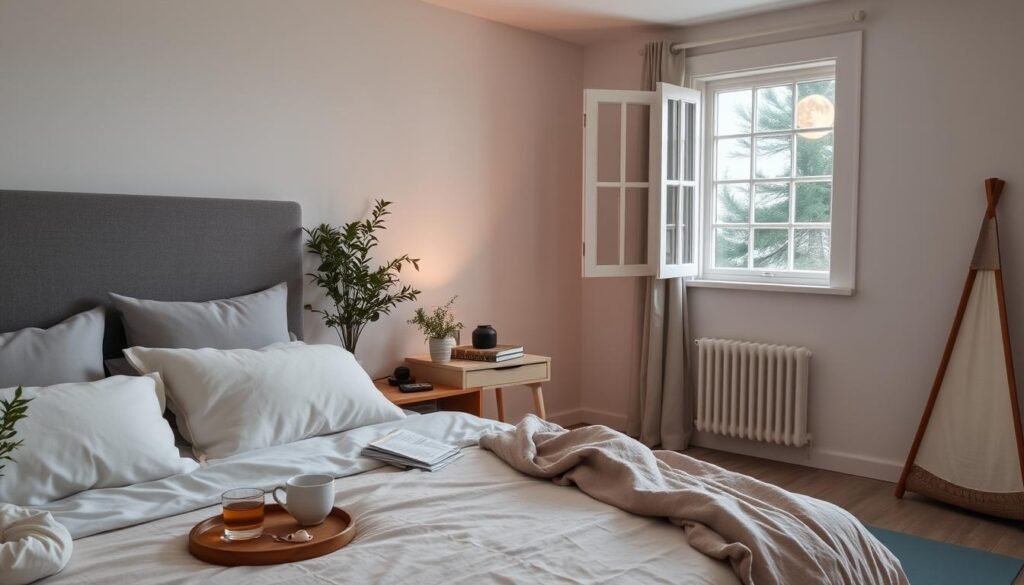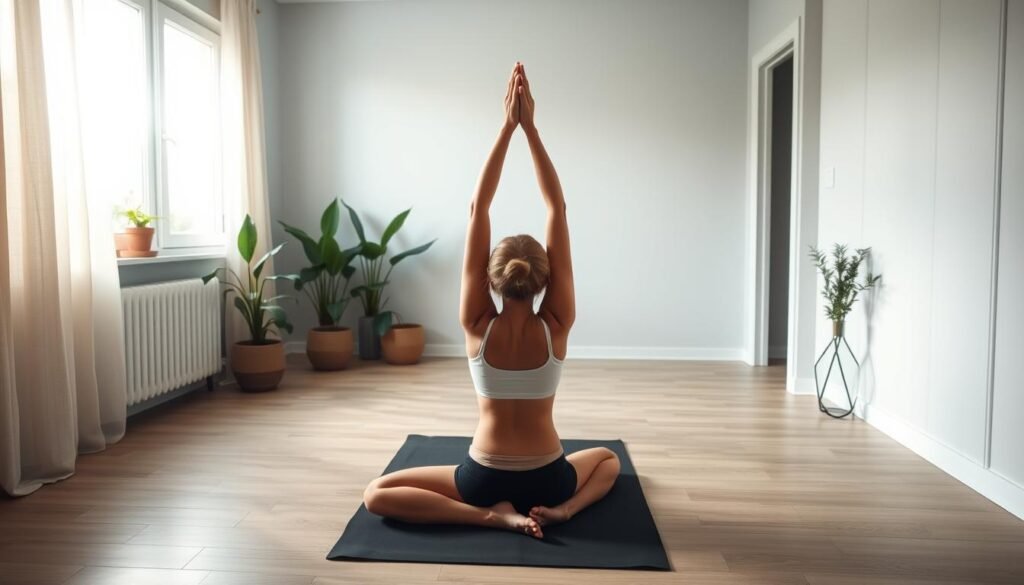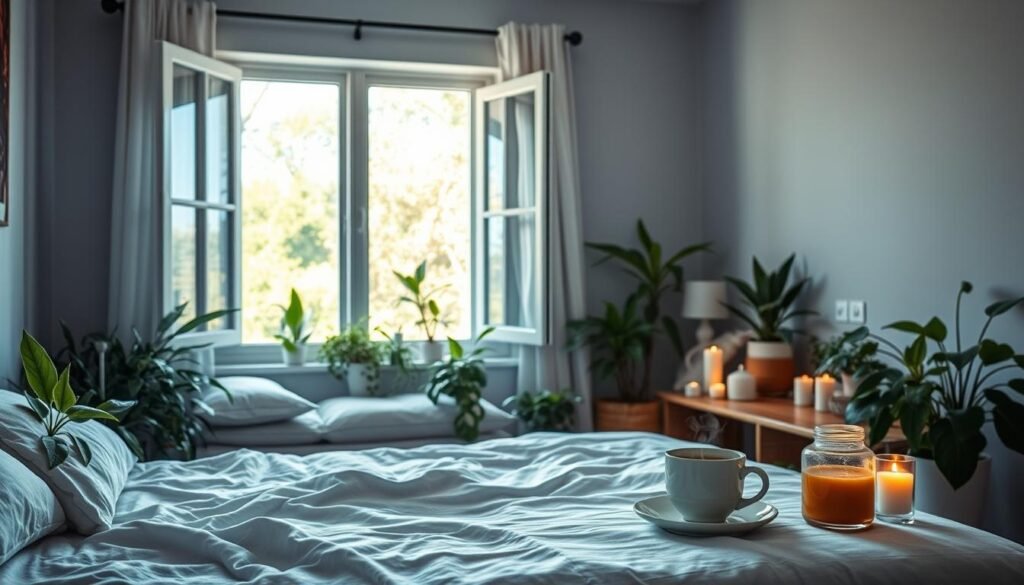About one third of adults in the U.S. get less than seven hours of sleep a night. This fact highlights how many people have trouble sleeping. People are now looking for ways to sleep better without using medicines. Natural remedies and changes in lifestyle are key for this.
In this article, we explore Lifestyle Changes to Combat Insomnia at Home. We talk about useful steps like having a regular bedtime, improving sleep hygiene, and using relaxation methods. Making these changes can greatly better your sleep. This leads to improved health both physically and mentally.
There are many ways to get better sleep, like mindfulness and changing what you eat. Thankfully, lots of studies show that these methods work. They help sleep quality. For tips on natural sleep help, visit this resource.
Key Takeaways
- One-third of adults in the U.S. experience insomnia, impacting overall well-being.
- Adopting mindfulness techniques can lead to significant improvements in sleep patterns.
- Establishing effective sleep hygiene practices is crucial for overcoming insomnia.
- Regular physical activity helps reduce insomnia symptoms; around 150 minutes a week is recommended.
- Natural remedies like magnesium and lavender can be effective in promoting better sleep.
Understanding Insomnia and Its Impact
Understanding insomnia is key to knowing its impact on daily life. It’s a common sleep disorder that makes falling asleep or staying asleep tough. It also includes waking up too early and not being able to fall back asleep. This condition leads to being very tired during the day, mood swings, and performing poorly in daily activities.
Insomnia can be either short-term or chronic. Short-term lasts a few days to weeks and is often due to stress, travel, or bad sleep habits. Chronic insomnia goes on for three months or more. It can deeply affect both physical and emotional health. It can lower performance, lead to mental health issues, and increase risk for diseases like high blood pressure and heart disease.
Many things can cause sleep disorders like insomnia. Stressful life events, not having a regular schedule, and medical problems are big causes. Older adults and women are more likely to have insomnia. This is due to changes in sleep patterns, health issues, and the medicines they take.
To fight insomnia, it’s important to find out why it’s happening and to practice good sleep habits. Keeping a regular sleep time, doing physical activities often, and making sure your sleeping area is comfy can help a lot. These steps improve sleep and make overall health better.
Recognizing the Symptoms of Insomnia
Knowing the signs of insomnia is essential for those wanting better sleep. Many people, up to two-thirds, deal with insomnia symptoms now and then. These issues can be slight or they can seriously mess with daily life. Look out for signs like:
- Difficulty falling asleep
- Waking up often during the night
- Feeling tired or unrefreshed upon waking
- Irritability and mood swings
- Difficulty concentrating during the day
About 10% to 15% of folks have chronic insomnia. Certain things make it more likely, like being female, getting older, and some health issues such as diabetes or chronic pain. Catching insomnia early lets people change their habits or get help. One good option is cognitive behavioral therapy for insomnia (CBT-I), which is top-rated for serious cases.
Becoming aware of sleep issues is key. Stress, meds, and changes in routine can all disturb sleep. Paying attention to sleep patterns and any stressful thoughts before bed is important. These habits often lead to more trouble with insomnia. Understanding these signs helps in handling them better and getting good sleep.
Importance of Sleep Hygiene
Good sleep hygiene is key for sound sleep and reducing insomnia. It involves steps to make a comfortable sleep environment and a consistent sleep schedule.
Creating a Comfortable Sleep Environment
A calming sleep area is vital for good sleep quality. It should be dark, quiet, and at a cool temperature. The right mattress and bedding are crucial for comfort. To improve this setting:
- Use blackout curtains to keep it dark
- Try earplugs or white noise machines for quiet
- Keep the room cool
- Use calming scents like lavender for relaxation
Having quality bedding helps in getting restful sleep. Knowing how your surroundings affect sleep can help you create the perfect sleep place.
Establishing a Consistent Sleep Schedule
Keeping a regular sleep schedule helps your body’s clock stay on track. Sleeping and waking up at the same time every day improves your sleep quality. To better your routine:
- Slowly change your sleeping times to set a new schedule
- Only nap in the early afternoon to avoid sleep problems
- Do relaxing activities before bed to prepare for sleep
- Avoid screens when you’re getting ready to sleep
A steady sleep routine is important for your health and daily function. The right habits not only make for a comfortable sleep environment but also boost your sleep hygiene.
Lifestyle Changes to Combat Insomnia at Home
Making Lifestyle Changes to Combat Insomnia at Home can really improve your sleep. People with insomnia can get better by using certain tactics. These include relaxation methods and a bedtime routine that helps your body get ready to sleep.
Adopting Relaxation Techniques
Adding relaxation methods to your daily routine is key to handling insomnia. Trying out mindfulness meditation, muscle relaxation, or yoga can make a difference. These activities lower stress and make you feel happier. Plus, they might even keep you healthier. Doing these regularly helps calm your mind for a good night’s sleep.
Implementing a Calming Bedtime Routine
Having a calming routine at night tells your body it’s time to slow down. This can involve enjoyable things like reading, stretching, or a warm bath. Such actions make the sleep environment more welcoming. For more tips on sleep-improving self-care, click on this resource.

Natural Remedies for Better Sleep
Natural remedies can help you sleep better. Adding essential oils, magnesium, and melatonin to your night routine helps. It’s good to check each remedy’s impact on your sleep needs.
Using Essential Oils like Lavender
Lavender essential oil is known for its calming effects. It can ease anxiety and bring a peaceful night’s sleep. Studies show it improves sleep quality and duration. Using lavender oil by diffusion or topical application at night can help.
The Benefits of Magnesium and Melatonin
Magnesium helps relax muscles and reduce stress, aiding sleep. It can help lessen insomnia symptoms, research says. Melatonin, a sleep cycle hormone, shortens the time to fall asleep. Taking 0.1 to 0.3 milligrams might promote better sleep. These remedies can improve sleep habits. For more info on sleep aids, check reputable websites.
Exercise for Improved Sleep Quality
Regular exercise can make your sleep better and ease insomnia. Moderate physical activity helps you relax and feel happier. Even just 30 minutes a day can help you fall asleep faster and sleep longer. Being consistent is very important.
The Role of Moderate Physical Activity
Moderate physical activity is key in reducing sleep problems. It not only helps you fall asleep quicker but also improves deep sleep. That’s crucial for your body to recover. People who follow an exercise plan often sleep about 13 minutes faster and 18 minutes longer after a month.
Timing Your Workouts for Optimal Sleep
When you exercise matters a lot for sleep. Working out in the morning or afternoon is best. Exercising too late can keep you awake due to more energy and alertness. It’s best to work out a few hours before bedtime.

Choosing the right time to exercise can lead to better sleep. A consistent routine of exercise for sleep and pre-sleep habits helps a lot. Try to find exercises you enjoy to keep doing them, as this is key for beating insomnia in the long run.
| Factors | Pattern | Effect on Sleep |
|---|---|---|
| Regular Exercise | More than 150 minutes a week | Enhanced sleep quality |
| Moderate Activity | Walking, swimming, cycling | Increases deep sleep |
| Vigorous Activity | Running, HIIT | Not as effective for sleep |
| Evening Workouts | Completed 1 hour before sleep | May improve sleep quality |
Adding exercise to your daily life can greatly improve your sleep over time.
Dietary Modifications for Sleep Support
What we eat is key to how well we sleep. Foods high in fat or too processed can ruin a good night’s sleep. On the other hand, some foods can help us sleep better. Making the right food changes can boost our health and fight insomnia.
Foods That Promote Sleep
Eating certain foods can really help our sleep. Here’s a list of sleep-friendly foods:
- Bananas: Their magnesium can relax your muscles.
- Oatmeal: It triggers serotonin release, leading to better sleep.
- Cherries: They naturally have melatonin to regulate sleep.
- Turkey: It’s filling and may help you sleep, but don’t overdo it.
- Almonds: Like bananas, they’re great for calming the nerves.
Avoiding Sleep Disruptors like Caffeine and Alcohol
However, some foods and drinks harm our sleep. Watch out for:
- Caffeine: It’s in coffee, tea, and some sodas. It can keep you awake for hours. Even decaf kinds might have some, so read labels carefully.
- Alcohol: It might make you sleepy at first, but it’ll mess up your sleep later.
- Spicy foods: They can cause heartburn, wrecking your sleep.
- High-protein foods: Hard-to-digest items like steak may keep you up.
Knowing how food affects sleep can help us make better choices at night. By picking foods that aid sleep and avoiding ones that don’t, we can enjoy more restful nights.
Stress Management Techniques
Managing stress is key to beating insomnia because it can make sleep problems worse. Using different stress management ways can help you feel better overall. Techniques like mindfulness and meditation help you focus and relax deeply.
Mindfulness and Meditation Practices
Mindfulness and meditation help you deal with stress better. They make you focus on now, reducing worry and bringing peace. Adding these exercises to your daily life can lower stress, make you think clearer, regulate emotions, and improve your life quality.
- Lowering stress levels
- Improving mental clarity
- Enhancing emotional regulation
- Increasing overall quality of life
Mindfulness can be done almost anywhere, making it great for everyday stress. Using these methods regularly can make you sleep better and tackle daily problems easier.
Utilizing Progressive Muscle Relaxation
Progressive Muscle Relaxation (PMR) is a great way to relax by tensing and then relaxing your muscles. It makes you more aware of your body and helps you relax deeper. PMR can cut muscle tightness, lower blood pressure and heart rate, ease anxiety, and make sleep better.
- Reducing muscle tension
- Lowering blood pressure and heart rate
- Alleviating symptoms of anxiety
- Improving sleep onset and quality
Creating a stress management plan with mindfulness and PMR can improve your sleep. Practicing these techniques gives you tools to notice and lessen stress symptoms effectively.

| Technique | Benefits | Methods |
|---|---|---|
| Mindfulness | Reduces stress, enhances emotional well-being | Meditation, focused breathing, being present |
| Progressive Muscle Relaxation | Relieves tension, improves sleep quality | Tensing and relaxing muscle groups, visualization |
Adding these methods to your life helps you get better at noticing stress early. You can stop it before it messes with your sleep, possibly transforming how well you sleep.
Seeking Professional Support When Needed
Trying home remedies for insomnia can work, but sometimes *seeking professional support* is key. Chronic insomnia impacts everyday life, affecting mood and how well you do at work or school. If you struggle with sleep for a long time, consider specialized treatment options.
Understanding the Role of Cognitive Behavioral Therapy
Cognitive Behavioral Therapy (CBT) for insomnia targets the root problems of sleep issues. It teaches people to change the thoughts and actions that harm their sleep. CBT-I includes practices like controlling stimuli, limiting sleep time, and relaxation, improving sleep patterns. Studies show that 70% to 80% of patients see better sleep with CBT-I.
Consulting a Healthcare Professional for Chronic Insomnia
Seeing a healthcare pro is crucial if chronic insomnia affects your life. They can find health issues that might be causing sleep problems. Working with these experts can make treatments work better. Folks should explore all options, including meds, lifestyle changes, and stress management. For tips on how to talk about insomnia with a doctor, visit effective communication tips.
| Benefits of Seeking Professional Support | Description |
|---|---|
| Improved Sleep Quality | Structured therapies like CBT-I can significantly enhance sleep quality. |
| Addressing Underlying Conditions | A healthcare professional can identify and treat conditions contributing to insomnia. |
| Personalized Treatment Plans | Developing a tailored approach increases the likelihood of successful interventions. |
| Long-Term Solutions | Therapies and strategies learned can provide lasting improvement in sleep patterns. |
Conclusion
To solve insomnia, a detailed plan is essential. This wrap-up highlights how changing our daily habits can improve our sleep. A lot of people, especially college students, have trouble sleeping well during the pandemic. By looking at their habits around food, exercise, and screen time, they can start to form better routines that lead to good sleep.
Studies suggest that sticking to good sleep habits and being active helps people sleep better. For example, people recovering from sleep issues often eat more regularly and live healthier than those with ongoing sleep problems. This shows how important personalized plans are for better sleep and effective insomnia management.
Putting these strategies into practice can really improve how well we function day to day. As we work towards better sleep, using relaxation techniques, changing what we eat, and keeping a regular schedule are key. Taking these steps helps us enjoy restful nights and a fulfilling life.